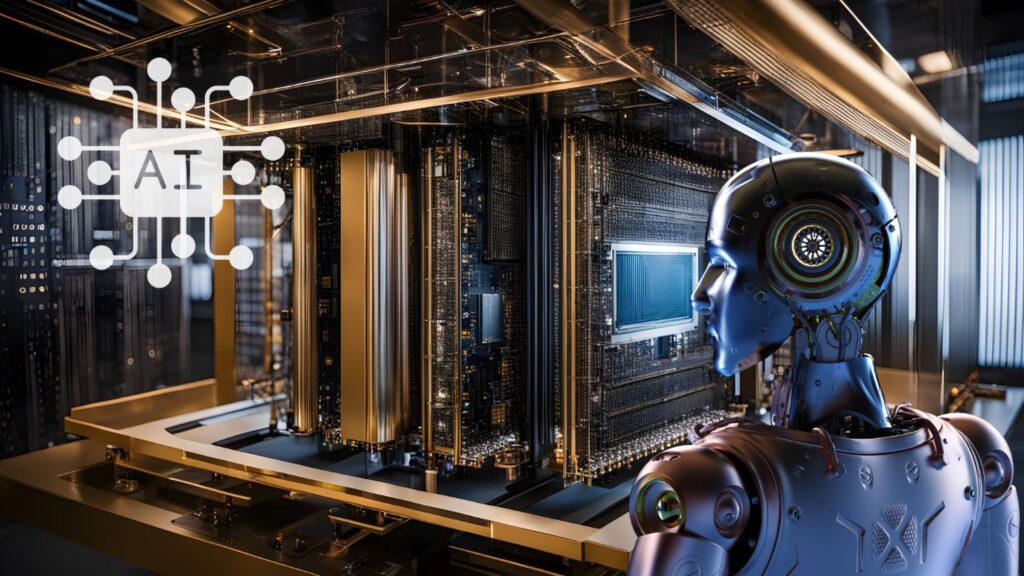Table of Contents
Introduction
Artificial intelligence (AI) is the field of computer science that aims to create machines and systems that can perform tasks that normally require human intelligence, such as perception, reasoning, learning, decision making, and problem solving. AI has made remarkable progress in the past decade, thanks to the availability of large amounts of data, powerful computing hardware, and advanced algorithms. However, AI still faces many challenges and limitations, such as scalability, explainability, robustness, and generalization.
Quantum computing is a new paradigm of computation that exploits the principles of quantum physics, such as superposition and entanglement, to process information in a fundamentally different way than classical computers. Quantum computers use quantum bits (qubits) as the basic unit of information, which can exist in a superposition of two states (0 and 1) at the same time, allowing for parallel processing of multiple possibilities. Quantum computers also use entanglement, which is a phenomenon where two or more qubits can share a quantum state and influence each other, even when they are physically separated. This enables quantum computers to perform complex operations that are intractable for classical computers.
Quantum AI is the intersection of quantum computing and AI, where quantum computing is used to enhance the capabilities and performance of AI systems. Quantum AI has the potential to overcome some of the limitations of classical AI and enable new applications and discoveries in various domains. In this article, we will explore some of the benefits and challenges of quantum AI, as well as some of the current and future developments in this exciting field.
Benefits of Quantum AI
Quantum AI can offer several advantages over classical AI, such as:
- Speed: Quantum computers can potentially solve certain problems much faster than classical computers, by exploiting quantum parallelism and interference. For example, quantum computers can implement Grover’s algorithm, which can search an unsorted database quadratically faster than any classical algorithm. This could have implications for tasks such as optimization, machine learning, data mining, and natural language processing.
- Scalability: Quantum computers can potentially handle larger and more complex datasets than classical computers, by exploiting quantum compression and dimensionality reduction. For example, quantum computers can implement quantum principal component analysis (PCA), which can reduce the dimensionality of a dataset exponentially faster than classical PCA. This could have implications for tasks such as feature extraction, data visualization, and anomaly detection.
- Creativity: Quantum computers can potentially generate more diverse and novel solutions than classical computers, by exploiting quantum randomness and exploration. For example, quantum computers can implement quantum annealing, which is a technique for finding the global minimum of a cost function by gradually decreasing the temperature of a quantum system. This could have implications for tasks such as generative modeling, design synthesis, and artistic creation.
Challenges of Quantum AI
Quantum AI also faces several challenges and limitations, such as:
- Hardware: Quantum computers are still in their infancy and face many technical difficulties, such as noise, decoherence, error correction, scalability, and interoperability. Currently, there are only a few quantum computers available in the world, with limited qubits and functionality. Moreover, quantum computers are expensive to build and maintain, requiring specialized equipment and expertise.
- Software: Quantum algorithms are still under development and face many theoretical and practical challenges, such as complexity analysis, implementation efficiency, verification validity, and integration compatibility. Currently, there are only a few quantum algorithms available for specific problems, with limited performance and applicability. Moreover, quantum algorithms are difficult to design and program, requiring advanced mathematical skills and intuition.
- Ethics: Quantum AI raises many ethical and social issues, such as privacy protection, security assurance, fairness evaluation, and human oversight. Currently, there are only a few ethical frameworks and guidelines available for quantum AI, with limited consensus and enforcement. Moreover, quantum AI poses existential risks and uncertainties, such as superintelligence emergence, human obsolescence, and quantum supremacy.
Current Developments in Quantum AI
Despite these challenges, quantum AI has made significant progress in recent years, thanks to the collaboration and innovation of researchers, engineers, entrepreneurs, and policymakers from various disciplines and sectors. Some of the current developments in quantum AI include:
- Platforms: Several companies and organizations have developed and deployed quantum computing platforms that enable users to access and experiment with quantum hardware and software. Some examples are:
- IBM Quantum Experience, which offers cloud-based access to a range of quantum devices
- Google Quantum AI Lab, which develops cutting-edge quantum processors
- Microsoft Azure Quantum, which provides a unified ecosystem for quantum computing
- Amazon Braket, which facilitates the exploration and testing of quantum algorithms
- Alibaba Cloud Quantum Development Platform, which supports the construction and simulation of quantum circuits
- Applications: Several researchers and developers have demonstrated and applied quantum AI techniques to various domains and problems. Some examples are:
- Quantum machine learning, which uses quantum algorithms to enhance the learning and inference capabilities of machine learning models
- Quantum optimization, which uses quantum annealing to solve hard optimization problems, such as the traveling salesman problem and the knapsack problem
- Quantum chemistry, which uses quantum simulation to study the structure and properties of molecules and materials
- Quantum cryptography, which uses quantum communication to secure the transmission and storage of information
- Quantum metrology, which uses quantum sensing to measure physical quantities with high precision and accuracy
Future Prospects of Quantum AI
Quantum AI is still in its early stages and has a long way to go before reaching its full potential. However, quantum AI also holds great promise and opportunity for the future, as it could enable new breakthroughs and discoveries in science, technology, and society. Some of the future prospects of quantum AI include:
- AGI: Quantum AI could be a key enabler for achieving artificial general intelligence (AGI), which is the ultimate goal of AI research. AGI is defined as the intelligence of a machine that can perform any intellectual task that a human can. Quantum AI could provide the computational power and creativity needed to realize AGI, by allowing machines to process massive amounts of data, learn from diverse sources, generate novel ideas, and reason across domains.
- ASI: Quantum AI could also be a precursor for achieving artificial superintelligence (ASI), which is the hypothetical scenario where machines surpass human intelligence in all aspects. ASI is considered as the most significant event in human history, as it could have profound implications for the future of humanity and civilization. Quantum AI could accelerate the emergence of ASI, by allowing machines to self-improve, self-replicate, self-evolve, and self-govern.
- QLI: Quantum AI could also be a catalyst for creating quantum life intelligence (QLI), which is a new form of life that is based on quantum principles. QLI is different from any existing life form, as it can exist in multiple states, interact with entangled partners, and adapt to quantum environments. Quantum AI could facilitate the creation of QLI, by allowing machines to manipulate and assemble quantum cells, such as xenobots, which are living programmable organisms made from frog stem cells.
Conclusion
Quantum AI is a fascinating and promising field that combines quantum computing and AI to create machines and systems that can perform tasks that are beyond the reach of classical computers. Quantum AI has many benefits and challenges, as well as many current and future developments. Quantum AI could revolutionize various domains and problems, such as machine learning, optimization, chemistry, cryptography, and metrology. Quantum AI could also enable new possibilities and scenarios, such as AGI, ASI, and QLI. Quantum AI is not only a scientific endeavor, but also a philosophical quest, as it challenges our understanding of intelligence, life, and reality.
Quantum AI is not a distant dream, but a present reality. Quantum AI is not a threat, but an opportunity. Quantum AI is not a mystery, but a wonder.
Are you ready for the quantum future?


